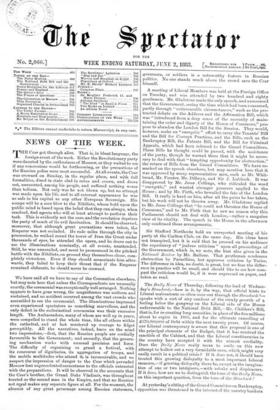A meeting of Liberal Members was held at the Foreign
Office on Tuesday, and was attended by two hundred and eighty gentlemen. Mr. Gladstone made the only speech, and announced that the Government, seeing the time which had been consumed, partly through " unfavourable circumstances," such as the pro- tracted debate on the Address and the Affirmation Bill, which was "introduced from a deep sense of the necessity of main- taining the order and dignity of the House of Commons," pro- pose to abandon the London Bill for the Session. They would, however, make an " energetic " effort to carry the Tenants' Bill and the Bill for Corrupt Practices, and the Bills, such as the Bankruptcy Bill, the Patents Bill, and the Bill for Criminal Appeals, which had been referred to the Grand Committees. These Bills he thought could be passed, with the assistance of the party, though he warned them that it might be neces- sary to deal with that " tempting opportunity for obstruction," the return of Bills from the Grand Committees. We have re- marked on the speech elsewhere, but may mention here that it was approved by many representative men, such as Mr. Whit- bread, Mr. Forster, Mr. Dillwyn, and Sir J. Lubbock. It was disapproved by Mr. Jesse Collings, who ridiculed the word " energetic," and wanted stronger pressure applied to the House ; and by Mr. Firth, who bewailed the fate of the London Bill. It really is hard on him, after all the pains he has taken, but his work will not be thrown away. Mr. Gladstone replied to Mr. Jesse Collings that "he could not threaten the House of Commons," and to Mr. Firth that he saw no reason why this Parliament should not deal with London,—rather a sanguine view of its vitality. The speech in the House in the afternoon only confirmed these arrangements.


































